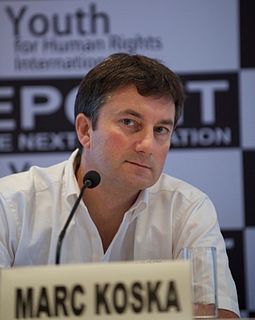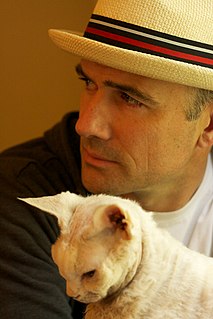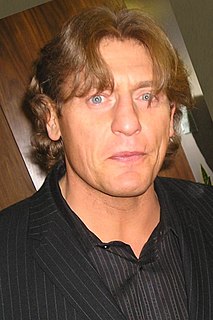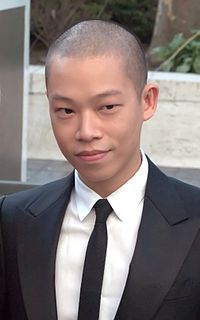A Quote by Marc Koska
I read a newspaper article in May 1984 which predicted that syringes would one day be a major cause of the transmission of HIV. It was what I had been waiting for - a project that had a lot of the things that I liked: problem-solving, product design, campaigning, and being a bit of a big mouth pain-in-the-bum.
Related Quotes
I'm not sure Riot Grrrl would have been as big a deal if the Internet had existed back then. Because there's so much stuff on the Internet. People could have been like, oh, whatever, I'm going to go look at pictures of Barbie vaginas, you know what I mean? There's so many different things on the Internet, you read one article and then you read something linked off that article and you go down the rabbit hole.
Every weekend from, like, 1974 to 1978, I'd trudge over to the Greenwich library, which gathered up almost every major newspaper in the country. I would sit there all day long and read and read and read the reviews. I remember being twelve or thirteen and writing to Judith Crist, Pauline Kael, and Roger Ebert.
After we had conducted thousands of experiments on a certain project without solving the problem, one of my associates, after we had conducted the crowning experiment and it had proved a failure, expressed discouragement and disgust over our having failed to find out anything. I cheerily assured him that we had learned something. For we had learned for a certainty that the thing couldnt be done that way, and that we would have to try some other way.
It had been a good day, all things considered. I had managed rather well on my own. I opened Grandfather's Bible. This is what it would be like when I had my own shop, or when I traveled abroad. I would always read before sleeping. One day, I'd be so rich I would have a library full of novel to choose from. But I would always end the evening with a Bible passage.
Every day or two, I strolled to the village to hear some of the gossip which is incessantly going on there, circulating either from mouth to mouth, or from newspaper to newspaper, and which, taken in homeopathic doses, was really as refreshing in its way as the rustle of leaves and the peeping of frogs.
At the breakfast table we are footnoting everything that we read. We don't recognise it as such but we encounter an article in the newspaper and then suddenly we recall that a friend had a certain comment on that particular story, a certain bit of news that we saw on the television applies to that and we immediately assemble an idea of a story.
My opening line to my students, and a recurring theme in my classes, was that the big design problem isn't designing a house for your parents or yourself, a museum, or a toaster, or a book, or whatever. The big design problem is designing your life. It's by the design of your life that you create the backboard off which you bounce all your thoughts and ideas and creativity. You have to decide what it is that you want to do each day.
I thought it sounded just like the sort of drug a man would invent. Here was a woman in terrible pain, obviously feeling every bit of it or she wouldn't groan like that, and she would go straight home and start another baby, because the drug would make her forget how bad the pain had been, when all the time, in some secret part of her, that long, blind, doorless and windowless corridor or pain was waiting to open up and shut her in again.
It seems like I always wrote, I just didn't think of it as a career choice. I just liked to tell stories ... to myself, to pen pals (I had a lot of them, all over the world). Of course this was in the days before computers were everywhere, and anyone could access the Web. You had to make an effort keeping up a correspondence, and the arrival of the mail once a day was a big deal. I think if modern technology had been around when I was a kid, I would never have left my bedroom except to take the dogs out for their run three times a day.




































